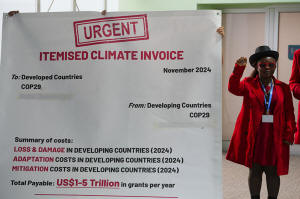Big money to respond to climate change is key to UN talks in Baku. How
can nations raise it?
 Send a link to a friend
Send a link to a friend
 [November 19, 2024] By
SETH BORENSTEIN and SIBI ARASU [November 19, 2024] By
SETH BORENSTEIN and SIBI ARASU
BAKU, Azerbaijan (AP) — Just as a simple lever can move heavy objects,
rich nations are hoping another kind of leverage — the financial sort —
can help them come up with the money that poorer nations need to cope
with climate change.
It involves a complex package of grants, loans and private investment,
and it's becoming the major currency at annual United Nations climate
talks known as COP29.
But poor nations worry they’ll get the short end of the lever: not much
money and plenty of debt.
Half a world away in Brazil, leaders of the 20 most powerful economies
issued a statement that among other things gave support to strong
financial aid dealing with climate for poor nations and the use of
leverage financial mechanisms. That was cheered by climate analysts and
advocates. But at the same time, the G20 leaders noticeably avoided
repeating the call for the world to transition away from fossil fuels, a
key win at last year's climate talks.
Money is the key issue in Baku, where negotiators are working on a new
amount for aid to help developing nations transition to clean energy,
adapt to climate change and deal with weather disasters. It’ll replace
the current goal of $100 billion annually — a goal set in 2009.
Climate cash could be in the form of loans, grants or private
investment
Experts put the need closer to $1 trillion, while developing nations
have said they'll need $1.3 trillion in climate finance. But negotiators
are talking about different types of money as well as amounts.
So far rich nations have not quite offered a number for the core of
money they could provide. But the European Union is expected to finally
do that and it will likely be in the $200 to $300 billion a year range,
Linda Kalcher, executive director of the think tank Strategic
Perspectives, said Tuesday. It might be even as much as four times the
original $100 billion, said Luca Bergamaschi, co-founding director of
the Italian ECCO think tank.
But there's a big difference between $200 billion and $1.3 trillion.
That can be bridged with “the power of leverage," said Avinash Persaud,
climate adviser for the Inter-American Development Bank.
When a country gives a multilateral development bank like his $1, it
could be used with loans and private investment to get as much as $16 in
spending for transitioning away from dirty energy, Persaud said. When it
comes to spending to adapt to climate change, the bang for the buck, is
a bit less, about $6 for every dollar, he said.
But when it comes to compensating poor nations already damaged by
climate change — such as Caribbean nations devastated by repeated
hurricanes — leverage doesn't work because there's no investment and
loans. That's where straight-out grants could help, Persaud said.
Whatever the form of the finance, Ireland’s environment minister Eamon
Ryan said it would be “unforgivable” for developed countries to walk
away from negotiations in without making a firm commitment toward
developing ones.
“We have to make an agreement here,” he said. "We do have to provide the
finance, particularly for the developing countries, and to give
confidence that they will not be excluded, that they will be center
stage.”
For developing nations, the talk of loans brings fear of debt
If climate finance comes mostly in the form of loans, except for the
damage compensation, it means more debt for nations that are already
drowning in it, said Michai Robertson, climate finance negotiator for
the Alliance of Small Island States. And sometimes the leveraged or
mobilized money doesn’t quite appear as promised, he said.

[to top of second column] |

Activists participate in a demonstration for climate finance at the
COP29 U.N. Climate Summit, Tuesday, Nov. 19, 2024, in Baku,
Azerbaijan. (AP Photo/Peter Dejong)
 “All of these things are just nice
ways of saying more debt,” Robertson said. “Are we here to address
the climate crisis, which especially small developing states, least
developed countries, have basically done nothing to contribute to
it? The new goal cannot be a prescription of unsustainable debt.”
His organization argues that most of the $1.3 trillion it seeks
should be in grants and very low-interest and long-term loans that
are easier to pay back. Only about $400 billion should be in
leveraged loans, Robertson said.
Leverage from loans “will be a critical part of the solution,” said
United Nations Environment Programme Director Inger Andersen. But so
must grants and so must debt relief, she added.
Bolivia's foreign policy director and chair of the Like-Minded Group
negotiating bloc Diego Balanza called out developed countries in
speech Tuesday, saying they have “squarely failed to provide
committed support to developing countries.”
“A significant share of loans has adverse implications for the
macroeconomic stability of developing countries,” Balanza said.
Rohey John, Gambia's environment minister, said the absence of a
financial commitment from rich nations suggests “they are not
interested in the development of the rest of the mankind.”
“Each and every day we wake up to a crisis that will wipe out a
whole community or even a whole country, to a crime that we never
committed," she said.
Praise and worry about G20 statement
The G20's mention of the need for strong climate finance and
especially the replenishment of the International Development
Association gives a boost to negotiators in Baku, ECCO's Bergamaschi
said.
“G20 Leaders have sent a clear message to their negotiators at
COP29: do not leave Baku without a successful new finance goal,”
United Nations climate secretary Simon Stiell said. “This is an
essential signal, in a world plagued by debt crises and spiraling
climate impacts, wrecking lives, slamming supply chains and fanning
inflation in every economy.”

But the G20 failed to talk about how much the funds will be for the
new goal, said Shepard Zvigadza, from South Africa’s Climate Action
Network. “This is a shame,” he said.
Analysts and activists said they were also worried because the G20
statement did not repeat the call for a transition away from fossil
fuels, a hard-fought concession at last year's climate talks.
Veteran climate talks analyst Alden Meyer of the European think tank
E3G said the watering down of the G20 statement on fossil fuel
transition is because of pressure by Russia and Saudi Arabia. He
said it is "just the latest reflection of the Saudi wrecking ball
strategy" at climate meetings.
All contents © copyright 2024 Associated Press. All rights reserved |